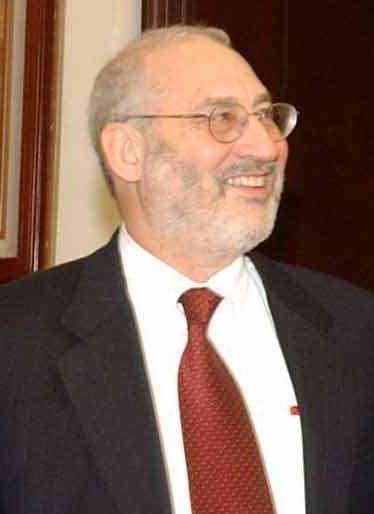Here’s an excerpt from Joseph Stiglitz’s essay (at guardian.co.uk) which I’ve borrowed from Mark Thoma’s blog. Stiglitz’s presents his political perspective on the economic principles embraced by the left vs. the right, and their effects on economic growth. 
Stiglitz: Turn Left for Growth
Who has the better prescription for economic growth, the left or the right? Joseph Stiglitz says that’s an easy call, it’s the left:
Turn left for growth, by Joseph Stiglitz, Comment is Free: Both the left and the right say they stand for economic growth. … There are, indeed, big differences in growth strategies, which make different outcomes highly likely.
The first difference concerns how growth itself is conceived. Growth … must be sustainable: growth based on environmental degradation, a debt-financed consumption binge, or the exploitation of scarce natural resources, without reinvesting the proceeds, is not sustainable.
Growth also must be inclusive; at least a majority of citizens must benefit. Trickle-down economics does not work… America’s recent growth was neither economically sustainable nor inclusive. Most Americans are worse off today than they were seven years ago.
But there need not be a trade-off between inequality and growth. Governments can enhance growth by increasing inclusiveness. … So it is essential to ensure that everyone can live up to their potential, which requires educational opportunities for all.
A modern economy also requires risk-taking. Individuals are more willing to take risks if there is a good safety net. If not, citizens may demand protection from foreign competition. Social protection is more efficient than protectionism.
Failures to promote social solidarity can have other costs… [For example, the] cost of incarcerating two million Americans – one of the highest per capita rates (pdf) in the world – should be viewed as a subtraction from GDP, yet it is added on.
A second major difference between left and right concerns the role of the state in promoting development. The left understands that the government’s role in providing infrastructure and education, developing technology, and even acting as an entrepreneur is vital. …[examples]
The final difference may seem odd: the left now understands markets… The right, especially in America, does not. The new right, typified by the Bush-Cheney administration, is really old corporatism in a new guise.
These are not libertarians. They believe in a strong state with robust executive powers, but one used in defense of established interests, with little attention to market principles. The list of examples is long, but it includes…
By contrast, the new left is trying to make markets work. Unfettered markets do not operate well on their own… Defenders of markets sometimes admit that they do fail, even disastrously, but they claim that markets are "self-correcting." …
Markets are not self-correcting in the relevant time frame. No government can sit idly by as a country goes into recession or depression, even when caused by the excessive greed of bankers or misjudgment of risks by security markets and rating agencies. But if governments are going to pay the economy’s hospital bills, they must … make it less likely that hospitalisation will be needed. The right’s deregulation mantra was simply wrong, and … the price tag – in terms of lost output – will be high, perhaps more than $1.5trn in the US alone.
The right often traces its intellectual parentage to Adam Smith, but … Smith recognised the … need for strong anti-trust laws.
It is easy to host a party. For the moment, everyone can feel good. Promoting sustainable growth is much harder. Today, in contrast to the right, the left has a coherent agenda, one that offers not only higher growth, but also social justice. For voters, the choice should be easy.
Joseph Eugene "Joe" Stiglitz (born February 9, 1943) is an American economist and a member of the Columbia University faculty. He is a recipient of the John Bates Clark Medal (1979) and the The Sveriges Riksbank Prize in Economic Sciences in Memory of Alfred Nobel (2001). Former Senior Vice President and Chief Economist of the World Bank, he is known for his critical view of globalization, free-market economists (whom he calls "free market fundamentalists") and some international institutions like the International Monetary Fund and the World Bank. In 2000 Stiglitz founded the Initiative for Policy Dialogue (IPD), a think tank on international development based at Columbia University. Since 2001 he has been a member of the Columbia faculty, and has held the rank of University Professor since 2003. He also chairs the University of Manchester’s Brooks World Poverty Institute and is a member of the Pontifical Academy of Social Sciences. Stiglitz is the most cited economist in the world, as of June 2008.




